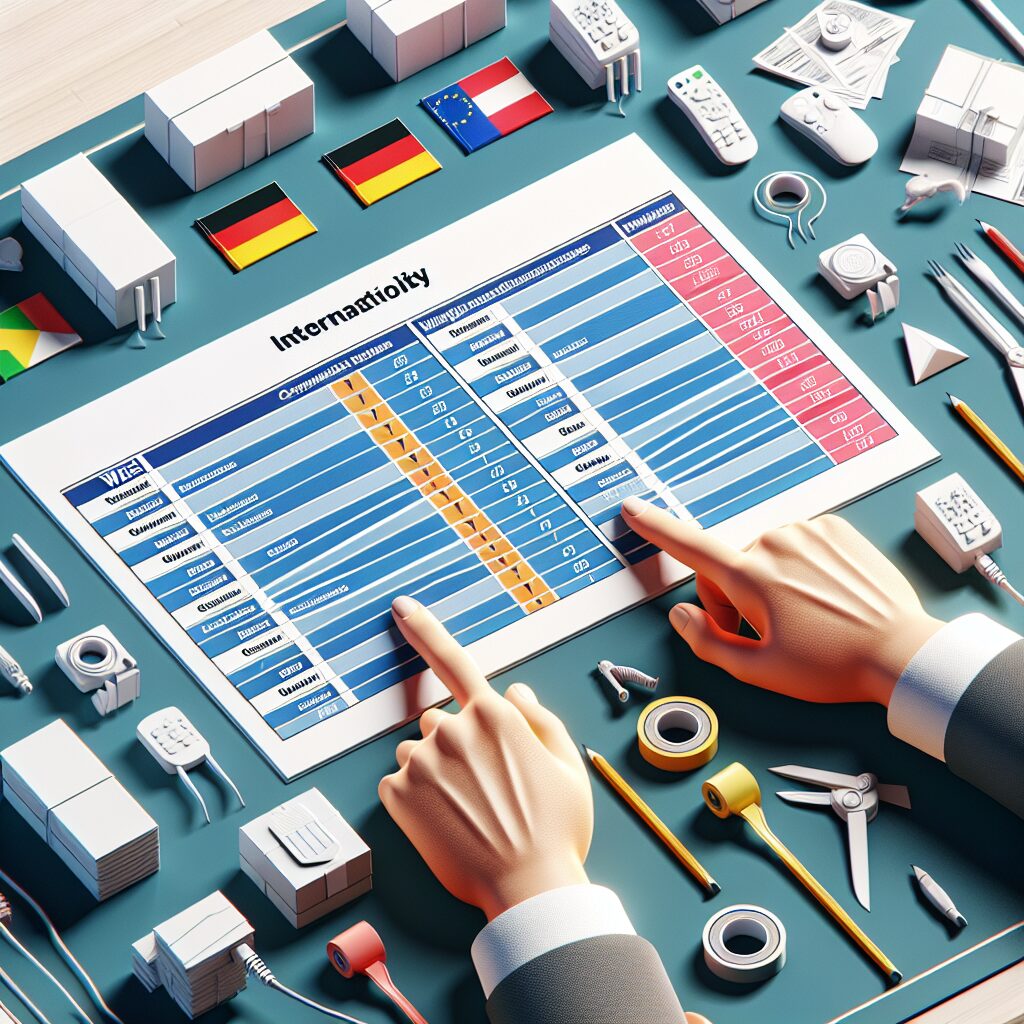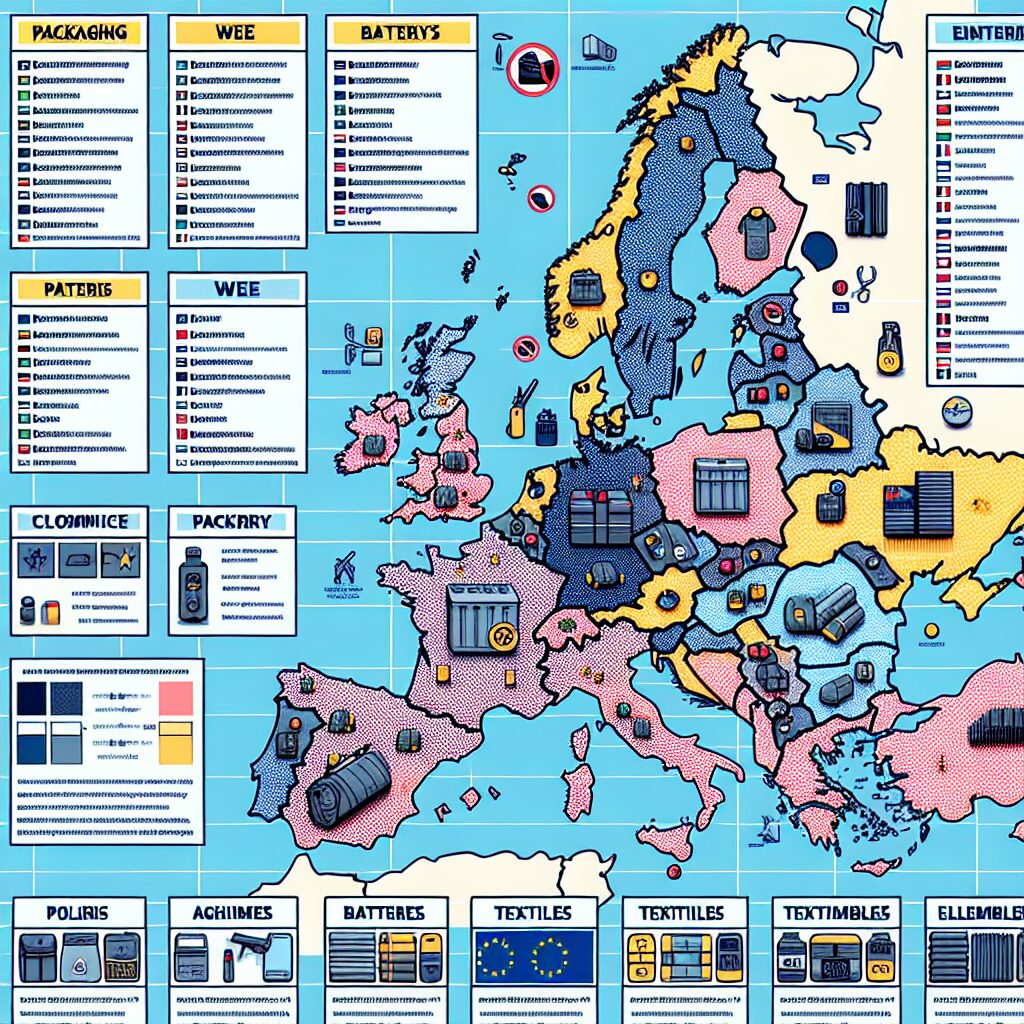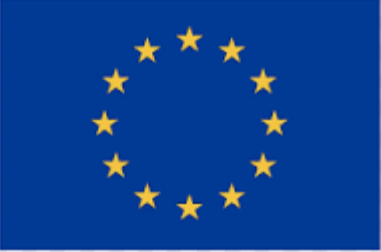About eldris
epr.eldris.ai leads the EPR sector, in fast, automated, AI Agent EU Complaince. LUCID Packaging, WEEE, and Battery Compliance for Brands, E-Commerce and Service based businesses expanding into the EU.
In This Article
- EPR compliance is mandatory for most product categories sold in the EU, especially packaging, electronics, and textiles.
- Sellers must register individually in each EU country where they operate.
- Platform enforcement by Amazon and eBay makes reporting and registration non-negotiable.
- Digital tools can help automate compliance and mitigate human error.
- Upcoming changes in 2025 will expand legal obligations—prepare proactively.
What Is EPR Compliance in the EU?
Understanding Extended Producer Responsibility
Extended Producer Responsibility, commonly referred to as EPR compliance, is a critical regulatory framework in the European Union that places the financial and administrative obligation on producers to manage the entire lifecycle of their products. This includes the collection, recycling, and disposal phases. The underlying goal of this policy is to shift the environmental burden of waste management from government authorities to product manufacturers and, by extension, to sellers and importers operating within the EU.
The principle of EPR compliance ensures that those who introduce products to the European market also bear responsibility for their environmental impact. This rule typically affects companies across sectors such as packaging, electrical and electronic equipment (EEE), batteries, furniture, textiles, and more. Becoming compliant not only mitigates legal risks but also reinforces a company’s sustainability credentials and builds consumer trust.

Who Needs to Comply With EU EPR Rules?
Applicable Seller Types and Products
Whether you’re a large-scale manufacturer or a small e-commerce business, if you place certain product types onto any EU market, EPR compliance applies to you. This includes businesses that package goods, sell electronics, produce printed paper, or offer certain textiles. Importantly, the responsibility often falls on the first entity introducing the item—frequently placing the burden of compliance on international sellers and not just EU-based producers.
Online retailers who operate through platforms like Amazon or eBay are not exempt. In many EU member states, compliance is mandatory even for remote sellers based outside the EU. If, for example, you ship electronic goods or packaged products to France or Germany, you are legally obligated to ensure your items are registered with the proper Producer Responsibility Organisations (PROs) and labelled as required.
Failure to adhere to EPR legislation can result in financial penalties, removal from marketplaces, and long-term reputational damage.
How to Register for EPR in Multiple EU Countries
Registering for EPR in each EU country poses a challenge, particularly because every member state enforces its own local interpretation of the EU Waste Framework Directive. Therefore, centralised registration is not possible—meaning sellers must register separately in each country where they sell applicable products.
The process typically begins by identifying the exact product categories for which EPR declarations are mandatory. Once categorised, sellers must contact authorised Producer Responsibility Organisations (PROs) in each target country. These entities then facilitate registration, fee collection, and compliance documentation. The documentation required varies, but often includes volume forecasts, historical sales data, and proof of local representation logistics.
Collecting EPR Registration Numbers
Upon registration, businesses receive official identifiers, often referred to as EPR numbers. These must be submitted to marketplaces like Amazon and eBay. These platforms routinely request these numbers to verify seller compliance. In France, for example, the ADEME (Agence de la transition écologique) manages the national register, and in Germany, the LUCID Packaging Register handles this function.
To streamline the process, consider working with consultants or compliance software providers that offer country-specific EPR support. This route can save time and ensure greater accuracy when submitting reports and product data.
Packaging Compliance: Triman, LUCID, Infotri & Beyond
Packaging presents some of the most nuanced responsibilities under EPR compliance. France, Germany, and other EU countries impose strict labelling and packaging disclosure rules. Sellers must understand region-specific systems such as the Triman logo in France or the LUCID register in Germany.
The Triman symbol, for instance, is mandatory in France for recyclable consumer goods packaging, alongside Infotri—the extended sorting information provided to consumers. These symbols inform customers how to properly recycle items and serve as evidence that products are responsibly managed. If you are targeting German consumers, obtaining a LUCID number for every package type is necessary. This process involves detailed submissions regarding packaging material, weight, and frequency of sales.
Sellers ignoring these localised stipulations often risk being de-listed from online marketplaces or attracting heavy penalties. Accurate and timely categorisation, supported by reliable software or consultancy, can simplify this layer of compliance.
Marketplace Enforcement: What Amazon and eBay Expect
Online marketplace enforcement is now one of the most potent drivers of EPR compliance adherence. Platforms such as Amazon and eBay are increasingly under pressure from EU regulators to ensure that sellers trading via their systems are EPR-compliant.
Amazon, for instance, has introduced automatic detection and warning systems that monitor seller activities. Sellers who fail to upload EPR registration numbers by the specified deadline may have their listings removed. Similarly, eBay now requires reseller declarations, verifying that suppliers operate in accordance with member state EPR laws.
These enforcement mechanisms are not mere formalities. Marketplaces can suspend listings, impose fines, or completely ban non-compliant operators. Uploading valid EPR numbers retrieved from the proper PROs ensures that your inventory remains live and your seller account remains in good standing.
Automating Your EPR Process With Digital Tools
Manual EPR tracking and reporting can become a logistics nightmare, especially when selling across several countries. Fortunately, a growing ecosystem of digital compliance tools now offers automation solutions to streamline the process.
Tools like EPR Tracker, EcoSoft, and ComplyDirect integrate directly with inventory and sales systems, enabling real-time updates on packaging, electronics, and textiles that require declarations. Many platforms offer downloadable reports ready for submission to national PROs, translating sales volume into compliance reports automatically.
A properly integrated system reduces human error, ensures consistency, and provides automated alerts ahead of declaration deadlines. While these systems require setup and configuration, their long-term benefits can be substantial—saving time, reducing fines, and minimising the risk of marketplace suspensions.
Country-by-Country EPR Requirements Overview
While the overarching principle of EPR remains consistent across the EU, execution differs by country. For instance, France’s requirements are far more extensive than those in smaller member states. French authorities require EPR declarations for packaging, WEEE, batteries, textiles, and even furniture and toys. Every category demands independent registration with a designated PRO.
Germany prioritises packaging through its LUCID system, but also imposes strict controls on electrical equipment and requires you to nominate an authorised representative if selling from outside the country.
Spain and Italy each maintain their own unique databases and labelling requirements. Sellers must investigate what specific laws apply based on where their customers are located. Learn more about EU Marketplace Compliance & Extended Producer Responsibility provides a country-specific breakdown of criteria to follow in each region.
Common Mistakes in EPR Registration and Reporting
Many sellers attempt to become compliant but fall short due to avoidable mistakes. One such common error is neglecting to register in every applicable country. Merely registering in one EU country does not confer compliance across the bloc, contrary to popular belief.
Another key issue is incorrect product classification. Misidentifying whether your goods fall into a regulated category—especially for combi-products composed of both electrical parts and packaging—can trigger compliance failures. Sellers also frequently miscalculate weight and quantities, leading to inaccurate fee declarations.
Late or infrequent reporting is another recurring issue. Many PROs operate monthly or quarterly reporting cycles. Missing these reports can result in penalties. Read a related article explains reporting timelines in detail, offering templates to ensure timely submissions.
Using Authorized Representatives for Cross-Border Sales
If you are a non-EU-based seller or manufacturer, EU regulations may require you to appoint an authorised representative (AR) within each selling country. This representative acts on your behalf in dealings with PROs and regulatory bodies, ensuring legal accountability.
The appointment of an AR is particularly crucial for WEEE and battery categories. In some jurisdictions, failure to engage an authorised representative invalidates your registration and may result in sanctions. It’s essential to sign a legal agreement outlining the AR’s duties, record-keeping responsibilities, and communication channels between them and your business.
ARs not only act as intermediaries but also provide strategic guidance, help interpret local laws, and assist in setting up the correct documentation workflows. They are a valuable asset in maintaining seamless compliance across multiple EU member states.
Prepare for 2025: Key Deadlines and Changes
The EPR landscape is continually evolving, and 2025 promises a raft of changes in the EU regulatory framework. Among the most anticipated developments is the introduction of digital product passports, designed to follow items throughout their lifecycle and improve traceability for recycling and repair.
Additionally, several nations plan to expand their EPR categories. France will be adding DIY and gardening supplies, while Germany’s new eco-modulation rules will increase fees for less recyclable packaging types. Sellers must familiarise themselves with these forthcoming policies and align their supply chain accordingly.
January 2025 marks several critical implementation deadlines for compliance declarations. Businesses failing to update their records and packaging standards ahead of these changes could incur significant disruptions. Overview of EU packaging compliance rules provides up-to-date information from the EU Commission on upcoming legislation and sector-specific faqs.
Conclusion: Stay Compliant and Grow in the EU Market
EPR compliance is not merely a bureaucratic exercise—it is an environmental imperative and a legal obligation for anyone selling in the European Union. Understanding local rules, registering properly, and consistently reporting can be the difference between brand growth and operational setbacks. By embracing automation, working with local experts, and staying ahead of 2025’s changes, businesses can greatly streamline their compliance workflow while contributing meaningfully to environmental sustainability. Preparing today ensures continued market access and bolsters your corporate reputation for eco-conscious responsibility.
Great guide on epr-compliance-basics-eu-sellers-guide – Community Feedback
What is EPR and who needs to comply in the EU?
EPR stands for Extended Producer Responsibility. Any company placing products, packaging, batteries, or electronics on the EU market—via e-commerce, marketplaces, or direct selling—must comply with EPR requirements in each relevant country.
How can sellers ensure EPR compliance across multiple EU countries?
Sellers must register in each country, use correct recycling labels (like Triman or LUCID), report volumes, and pay fees. Automated compliance solutions simplify registration and reporting for cross-border sales.
What are the risks of non-compliance with EPR in the EU?
Non-compliance can lead to delisting from marketplaces (e.g., Amazon, eBay), legal fines, and blocked imports, hindering your ability to sell in the EU. Proactive compliance avoids costly disruption.










